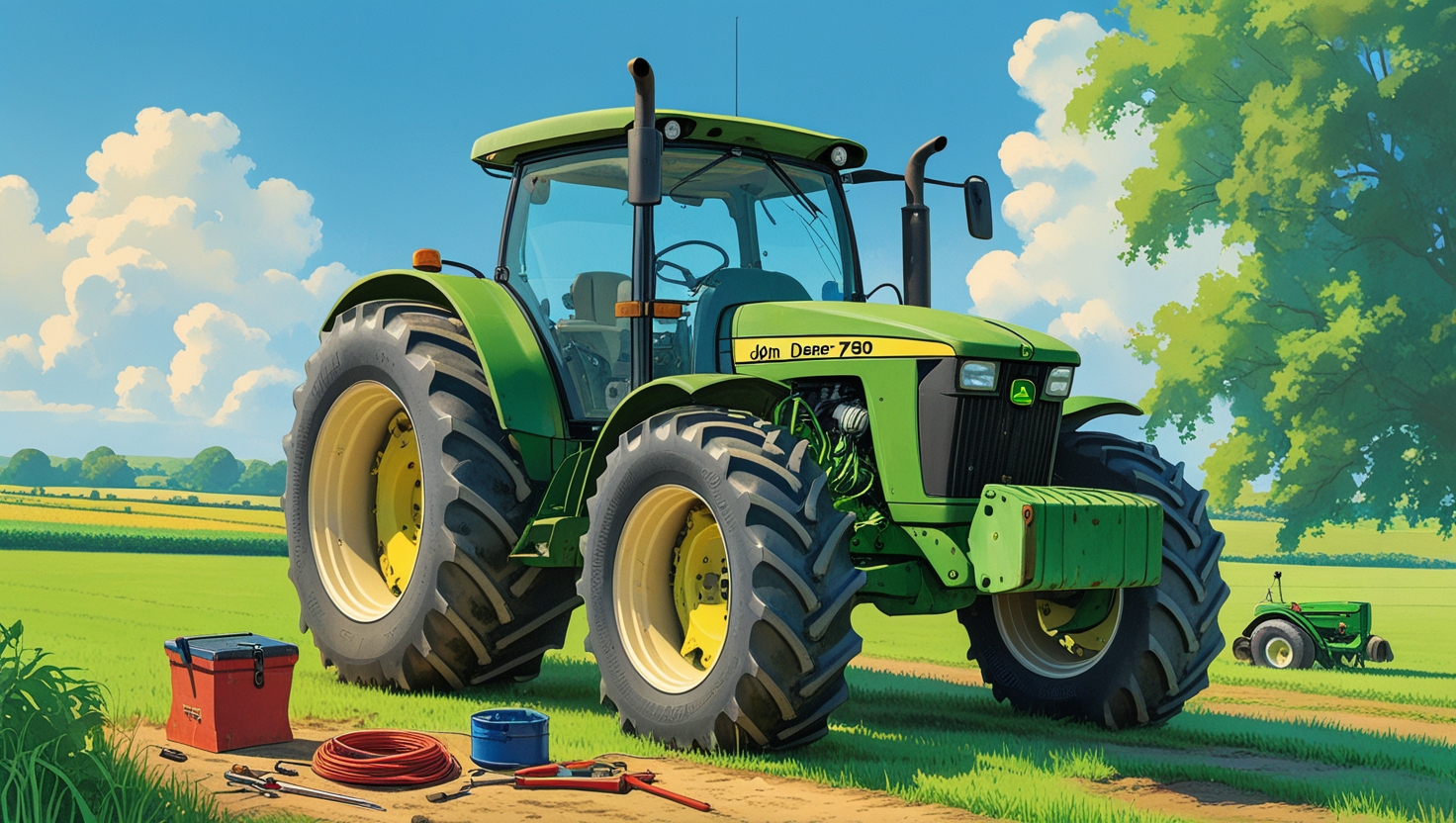Introduction
The John Deere 790 is a reliable and versatile compact utility tractor loved by homeowners and professionals alike. Whether you’re managing a large garden or maintaining a small farm, its robust design and dependable performance make it a trusted companion. However, like any machine, the John Deere 790 is not immune to problems.
Curious about the exact steps to fix these problems and avoid costly repairs? Discover practical solutions, maintenance tips, and expert advice in our comprehensive guide: “Top John Deere 790 Problems Every Owner Should Know.” Don’t let small issues slow you down—stay ahead with the right know-how!
Understanding potential issues with your tractor is crucial to ensure its longevity and keep it running smoothly. In this article, we’ll explore the most common John Deere 790 problems, discuss their causes, and provide practical solutions.
Why Knowing John Deere 790 Problems Matters
The John Deere 790 is a compact utility tractor celebrated for its reliability and performance. Whether you’re using it for farming, landscaping, or general property maintenance, keeping it in top shape is crucial. However, even this workhorse can face issues like engine troubles, transmission snags, and hydraulic system challenges.
By familiarizing yourself with these potential problems, you can tackle them head-on, reducing downtime and repair costs. Let’s dive into the common challenges and how to address them.
Common John Deere 790 Problems
Engine Starting Difficulties
One of the most frequent issues with the John Deere 790 is trouble starting the engine. This can disrupt your work schedule and lead to unnecessary downtime.
Causes:
- Battery Problems: Weak or dead batteries are often the culprit.
- Faulty Ignition System: Problems with the starter or ignition switch.
- Clogged Fuel Lines: Dirt or debris blocking the flow of fuel.
Symptoms:
- Slow cranking.
- Clicking sounds when you turn the key.
- Complete failure to start.
Solutions:
- Check the Battery: Test the voltage and clean the terminals.
- Inspect the Fuel System: Clear any blockages and ensure the fuel is clean.
- Ignition System Maintenance: Replace worn-out spark plugs and inspect the starter.
Hydraulic Transmission Problems
The hydraulic transmission system is vital for the tractor’s smooth operation. Over time, it can develop issues that affect performance.
Causes:
- Contaminated or low hydraulic fluid.
- Wear and tear on seals and hoses.
- Air bubbles in the hydraulic system.
Symptoms:
- Jerky or sluggish movements.
- Difficulty shifting gears.
- Noisy operation.
Solutions:
- Regular Fluid Checks: Ensure hydraulic fluid is clean and at the correct level.
- Seal and Hose Maintenance: Inspect for leaks and replace damaged components.
- Bleed the System: Remove air bubbles to restore proper function.
Oil Leaks
Oil leaks are a common issue for many tractors, including the John Deere 790. They can lead to decreased efficiency and potential damage to engine components.
Causes:
- Worn gaskets and seals.
- Cracks in the oil pan or engine block.
- Overfilled oil reservoirs.
Symptoms:
- Visible oil puddles under the tractor.
- Burning oil smell during operation.
- Decreased oil levels.
Solutions:
- Inspect Seals and Gaskets: Replace worn or damaged parts.
- Check for Cracks: Repair or replace the oil pan or block if necessary.
- Monitor Oil Levels: Avoid overfilling and maintain proper levels.
Transmission Concerns
Transmission issues can significantly impact the performance and reliability of your John Deere 790.
Causes:
- Gear wear and tear.
- Low or contaminated transmission fluid.
- Misalignment of components.
Symptoms:
- Grinding noises when shifting gears.
- Difficulty engaging gears.
- Loss of power during operation.
Solutions:
- Fluid Maintenance: Replace old fluid and clean the system.
- Gear Inspection: Replace worn-out gears and adjust alignment.
- Professional Help: Seek assistance for complex transmission repairs.
Engine Concerns
Engine problems can be a source of frustration and downtime for tractor owners.
Causes:
- Overheating due to a clogged radiator.
- Poor fuel quality.
- Insufficient lubrication.
Symptoms:
- Reduced engine power.
- Knocking or unusual noises.
- Overheating.
Solutions:
- Cooling System Maintenance: Clean the radiator and ensure proper airflow.
- Use High-Quality Fuel: Avoid fuel contamination and use recommended types.
- Regular Oil Changes: Keep the engine well-lubricated.
Wear and Tear on Components
Over time, general wear and tear on various parts can reduce the efficiency of your tractor.
Causes:
- Heavy usage.
- Lack of maintenance.
- Exposure to harsh environments.
Solutions:
- Routine Inspections: Regularly check for worn-out parts.
- Timely Replacements: Replace components showing signs of wear.
- Proper Storage: Protect the tractor from extreme weather conditions.
Mower Spindles
The mower spindles are crucial for smooth cutting operations, but they can be prone to failure.
Causes:
- Improper lubrication.
- Debris buildup.
- Excessive load.
Solutions:
- Keep Spindles Lubricated: Use grease as recommended in the manual.
- Clean Regularly: Remove debris after each use.
- Avoid Overloading: Operate within the recommended capacity.
No Spark
If the engine isn’t firing up, a lack of spark might be the problem.
Causes:
- Faulty spark plugs.
- Damaged ignition coils.
- Electrical issues.
Solutions:
- Replace Spark Plugs: Use high-quality replacements.
- Inspect Ignition Coils: Fix or replace damaged coils.
- Check Wiring: Ensure all connections are secure.
Drive Belt Issues
The drive belt is essential for transferring power to the tractor’s components. Issues here can halt operations.
Causes:
- Wear and tear.
- Misalignment.
- Overloading.
Solutions:
- Inspect Regularly: Check for cracks and fraying.
- Align Properly: Adjust to prevent slipping.
- Replace Worn Belts: Ensure you use the correct size and type.
Fuel Line and Fuel Pump Problems
Fuel delivery issues can significantly impact engine performance.
Causes:
- Clogged fuel lines.
- Faulty fuel pump.
- Contaminated fuel.
Solutions:
- Clean the Fuel Lines: Use a solvent to remove blockages.
- Replace Faulty Pumps: Invest in a high-quality replacement.
- Use Clean Fuel: Always use fresh and clean fuel to prevent contamination.
Preventative Maintenance Tips
To avoid recurring John Deere 790 problems, follow these preventative maintenance steps:
- Stick to a Maintenance Schedule: Regularly service your tractor according to the manufacturer’s guidelines.
- Inspect Before Use: Check for leaks, unusual noises, or visible wear before operating.
- Use Genuine Parts: Always opt for John Deere-certified parts to ensure compatibility and durability.
- Keep It Clean: Regularly wash your tractor to prevent dirt and debris from causing damage.
FAQs About John Deere 790 Problems
1. How often should I service my John Deere 790?
It’s recommended to perform a full service every 200 hours of operation or annually, whichever comes first.
2. Why does my John Deere 790 lose power under load?
Power loss is often due to fuel delivery issues or a clogged air filter. Regularly clean and replace these components.
3. Can I fix hydraulic leaks myself?
Yes, minor leaks can be fixed by replacing hoses or seals. However, for significant issues, consult a professional.
4. What’s the average lifespan of a John Deere 790?
With proper care and maintenance, a John Deere 790 can last for decades.
Conclusion
The John Deere 790 is a durable and dependable garden tractor, but like any machine, it requires proper care and attention. By understanding common John Deere 790 problems such as engine starting difficulties, hydraulic transmission issues, and oil leaks, you can take proactive steps to maintain its performance.
Regular maintenance, timely repairs, and using quality parts can go a long way in extending the life of your tractor. By addressing these issues early, you’ll keep your John Deere 790 running smoothly for years to come.

